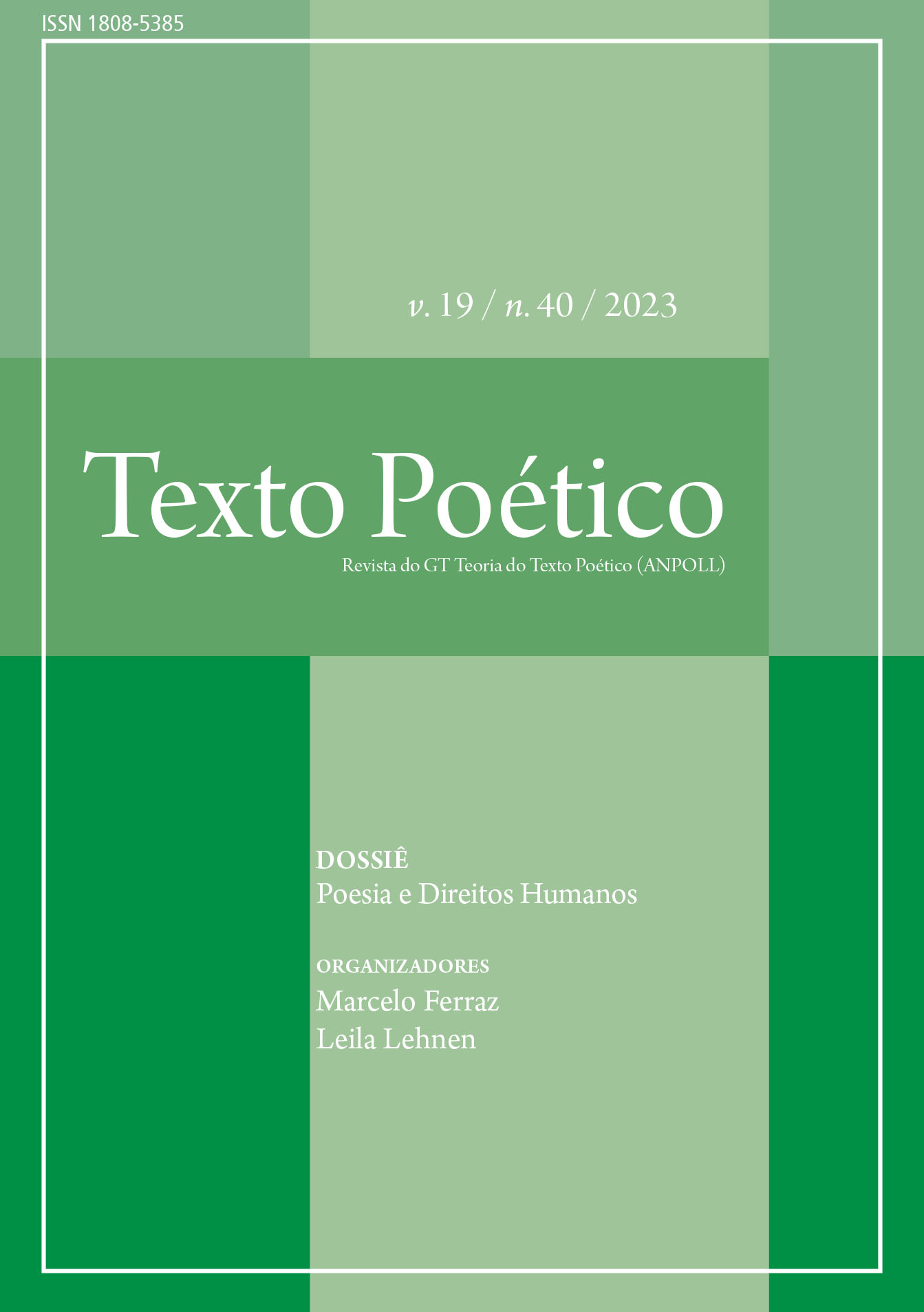Flores da batalha: The right to common and the struggle for recognition in the peripheral poetry of Sérgio Vaz
DOI:
https://doi.org/10.25094/rtp.2023n40a1025Keywords:
Peripheral Literature, Marginal Literature, Sérgio Vaz, Right to the commonAbstract
In this paper we analyze the literary work Flores da Batalha (2023), by the poet Sérgio Vaz. The proposal is to point out that in this poetry self-defined as peripheral and marginal, a utopia of emancipation and social recognition of the peripheral subject is revealed from an arduous battle for the conquest of rights, especially the right to the common and to the production and democratic fruition of literature. From this hypothesis, we seek to analyze some poems of the work, observing how the highlighted theme also develops in constructive and formal processes in a cultural context distanced from the literary tradition and close to peripheral forms of expression.
References
ADORNO, Theodor. “Palestra sobre lírica e sociedade”. In: Notas de Literatura. Tradução de Jorge de Almeida. São Paulo: Editora 34, 2003.
BOSI, Alfredo. O ser e o tempo da poesia. 6 ed. São Paulo: Companhia das Letras, 2000.
CANCLINI, Néstor Garcia. Consumidores e cidadãos: conflitos mundiais e globalização. 8 ed. Rio de Janeiro: Editora UFRJ, 2010.
CARACIOLA, Carolina Boari. 1 da Sul, mais do que uma marca, uma expressividade da periferia paulistana. In: Intercom. Anais do 40º Congresso Brasileiro de Ciências da Comunicação, Curitiba, set. 2017.
COLLOT, Michel. “O sujeito lírico fora de si”. Trad. Alberto Pucheu. Terceira Margem: Revista do Programa de Pós-Graduação em Ciência da Literatura. Rio de Janeiro, Universidade Federal do Rio de Janeiro, Ano IX, nº 11, p. 165-177, 2004.
DELEUZE, Gilles. Espinosa: filosofia prática. Tradução: Daniel Lins e Fabien Pascal. São Paulo: Escuta, 2002.
FERRÉZ (Org.). Literatura Marginal: talentos da escrita periférica. Rio de Janeiro: Agir, 2005. p. 9-14.
HOLLANDA, Heloisa Buarque de. Caminhos de um poeta cidadão (prefácio). In: VAZ, Sérgio. Literatura, pão e poesia: histórias de um povo lindo e inteligente. São Paulo, Global Editora, 2012.
JUSTINO, L. B. A literatura marginal e a tradição da literatura: o prefáciomanifesto de Ferréz, “Terrorismo Literário”. Gragoatá, v. 12, n. 23, 30 dez. 2007.
LAVAL, Christian; DARDOT, Pierre. Comum: Ensaio sobre a revolução no século XXI. Trad Mariana Echalar. São Paulo: Boitempo Editoral, 2017.
LUKÁCS, Georg. Introdução a uma estética marxista: sobre a categoria da particularidade. Tradução de Carlos Nelson Coutinho e Leandro Konder. Rio de Janeiro, RJ: Civilização Brasileira, 1978.
MARTINS, Nilce Sant’Anna. Introdução à estilística: a expressividade na língua portuguesa. 4.ª ed. São Paulo: Edusp, 2008.
NASCIMENTO, Érica Peçanha do. “Literatura marginal”: os escritores da periferia entram em cena. 2006. Dissertação (Mestrado) – Universidade de São Paulo, São Paulo, 2006. Disponível em: http://www.teses.usp.br/teses/disponiveis/8/8134/tde-03092007-133929/. Acesso em: 25 de maio 2022.
NASCIMENTO, Érica Peçanha do. Vozes marginais na literatura. Rio de. Janeiro: Aeroplano, 2009.
NEGRI, Antonio & HARDT, Michael. Bem estar comum. Tradução de Clóvis Marques. Rio de Janeiro: Record, 2016.
VAZ, Sergio. Flores da batalha. São Paulo: Global Editora, 2023.
VAZ, Sérgio (org.) O rastilho da pólvora: antologia do sarau da Cooperifa. São Paulo, Itaú Cultural, 2004.
WILLIAMS, Raymond. Recursos da esperança: cultura, democracia, socialismo. Tradução de Nair Fonseca. São Paulo, SP: Editora UNESP, 2015.
WISNIK, José Miguel. “Drummond e o mundo”. In: NOVAES, Adauto (Org.). Poetas que pensaram o mundo. São Paulo: Cia. das Letras, 2005. (p. 19-64)
Downloads
Published
How to Cite
Issue
Section
License
I authorize the Texto Poético Journal to publish the paper of my authorship/responsibility that I now submit, in case it is accepted for online publication.
Moreover, I declare that this contribution is original and that it was not submitted to any other editor for publication.
The copyright of the works published at the virtual space of the Texto Poético Journal are automatically entitled to the journal. Their total or partial reproduction is conditioned to the authors' citations and publication data.

Texto Poético is licensed under a Creative Commons - Attribution-NonCommercial 4.0 International (CC BY-NC 4.0).









